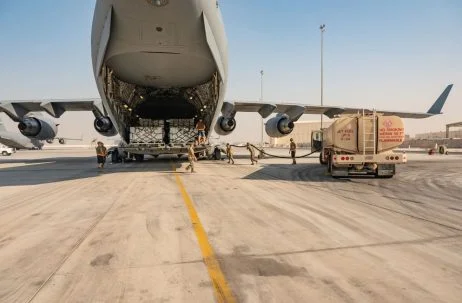Will the resumption of IMET be enough to revive the US-PAK relationship, considering Pakistan’s growing strategic partnership with China and the building pressure from the Taliban to not allow US Military to operate their bases?.
Resumption of Military Aid
Trump’s administration approved the resumption of the US military training program for Pakistan last year. This coveted US Military and Educational Program recommenced after a suspension of more than a year. The US Principal Secretary for South and Central Asian Affairs Ambassador Alice Well tweeted that the decisions were undertaken by Trump’s administration to strengthen the military-to-military cooperation between the US and Pakistan on a shared basis while prioritizing the US national security.
The International Military Education and Training (IMET) program was suspended in 2018 when Pakistan signed an agreement with Russia. The agreement allowed Pakistani military officers to receive training facilities in Russian Military Institutions. Following the same year in May; Washington suspended most of its security aid, delivery of military equipment and transfer of the security-related funds to Pakistan. Washington claimed that Islamabad has provided safe havens to the terrorists in Afghanistan. Pakistan completely denied all such allegations. Experts orated that the decision would undermine the trust and confidence-building measures between Islamabad and Washington.
However, the US approved the resumption of the training program and agreed to provide technical support to Pakistan regarding its fleet of F-16 aircraft.
These moves underscored the warming relations between the two countries after the meetings between Donald Trump and Imran Khan.
The US Request to Allocate Budget for Pakistan
The US State Department’s budget request for the year 2021 includes a total of 104 million USD for military training programs. These programs serve as an effective mean to strengthen the military alliances and the international coalitions which are mandatory to the US national security and regional stability. Out of this 104 million USD; the State Department has allocated 12.7 million USD for training the military offices of Central and South Asia. Pakistan’s share comprises 3.5 million USD for the resumption of the training programs.
The current IMET program supports the US Indo-Pacific strategy by putting the emphasis on professionalizing the armed forces of the regional partners, promoting professional military education, respect for the rule of law, human rights, and the civilian control of the armed forces. Moreover, the program also includes English language training which will enhance the partner’s abilities to interact with the US.
Reviving Relations
Evidently, the US is making such resumption efforts to improve the bilateral relationship between Pakistan and itself. The relations of the two countries faced heavy strains after the Abbottabad operation in 2011. The IMET program stands as a pillar of US-Pakistan military relations for more than a decade. Moreover, Washington has credited Islamabad’s role in the Afghan Peace Process. Similarly, the US acknowledges Pakistan’s efforts in the negotiations on the US troops withdrawal from Afghanistan.
The suspension of the military assistance included the cancellation of the 66 slots allocated to Pakistani military officers at National Defense University (NDU) Washington. However, the US military tried to keep these educational programs aloof from the political tensions, arguing that bringing the foreign military officers to the US pay long-term dividends.
Pakistan essential role in the Afghan Peace Process has also given birth to speculation about the Pentagon exploring Pakistan as an option for the provision of bases to conduct counterinsurgency operations and preventing Afghanistan from sliding into a civil war following the US withdrawal. However, Pakistan has shown an affirmative stance that it will not provide any bases to the US.
The Afghan Taliban have warned the neighbouring countries not to allow the US to operate its bases in their territories.
Pakistan has denied the provision of the bases. Nonetheless, Pakistan will cooperate with the US in the context of Air Lines of Communications (ALOC) and Ground Lines of Communications (GLOC) signed in 2001 for air and ground support.
Strategic Motives for the Revival in Relations
Pakistan and the US strained relations need a revival due to compelling strategic motives. Pakistani National Security Advisor Mueed Yusuf Pirzada has placed the revival of US-Pakistan relations as a foremost priority. Pakistan and China now have a growing strategic partnership in various domains. However, Pakistan will still try to revive its strategic partnership with the US.
Pakistan’s economic condition is challenging to the present government. Despite Khan’s provisional estimates of a 3.94% GDP growth rate during the fiscal year 2021; the Pakistani economy is still shackled with a lower growth rate, inflation, and debts. Moreover, the lingering sword of FATF, security and foreign policy challenges coupled with the threat of Afghan conflict spilling over into Pakistani soil after the US withdrawal are the strategic motives for the revival in the relations.
The US alliance has brought significant military surpluses to Pakistan. Pakistan received a lavish amount of military and financial assistance accounting for almost 33 billion USD during 2002-17. According to CRS Report for Congress (2007), Pakistan received arm deliveries of 4.6 billion USD during 1999-2006. Similarly, during 1999-2002 the estimated assistance amounted to 2.8 billion USD. This made Pakistan the tenth-largest recipient of US military aid in the world.
The US is looking towards the options available on its table regarding the military bases for the surveillance and the counter-terrorism operations after its withdrawal from Afghanistan. Pakistan is a feasible option for the US as compared to other options. This includes the Central Asian Republics, US Bases in the Gulf and US aircraft carriers in the Arabian Sea. The little clarity regarding CARs and the increased distance from the Gulf makes Pakistan a viable option for the US.
Conclusion
In a nutshell, the resumption of the US military training program shows the US commitment to strengthening bilateral military cooperation. It reflects the US’ Indo-Pacific strategy to professionalize the armed forces of regional partners.
The role of Pakistan in the Afghan Peace Process has also nudged the US to revive the strained bilateral relations.
Moreover, it also has given rise to the speculation about Pentagon exploring Pakistan to provide its bases. This is in regards to the US counterinsurgency operations after US withdrawal from Afghanistan. However, the strategic motives are still the compelling factor to revive the relations between both states.
Pakistan has skillfully managed its relations with both China and the US in the past. However, it still remains ambiguous that whether Pakistan will reset its relationship with the US without disturbing its strategic partner China. The situation will soon unfold shortly after the scheduled US withdrawal from Afghanistan.
Also See: Chinese Interest in Afghanistan After the US Withdrawal





![Ukrainian and Russian flags with soldier silhouettes representing ongoing conflict. [Image via Atlantic Council].](https://southasiatimes.org/wp-content/uploads/2026/02/2022-02-09T000000Z_1319661209_MT1NURPHO000HXCNME_RTRMADP_3_UKRAINE-CONFLICT-STOCK-PICTURES-scaled-e1661353077377.jpg)

